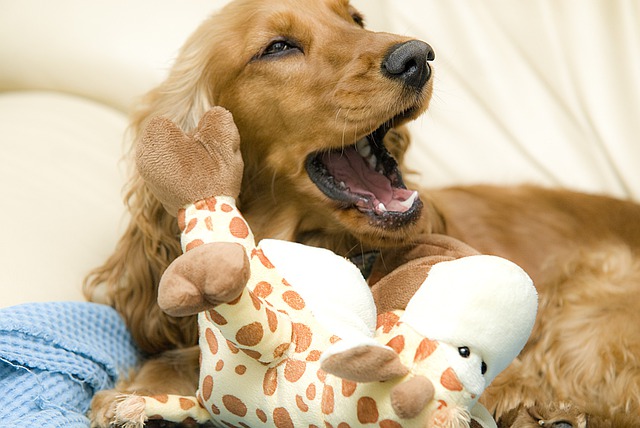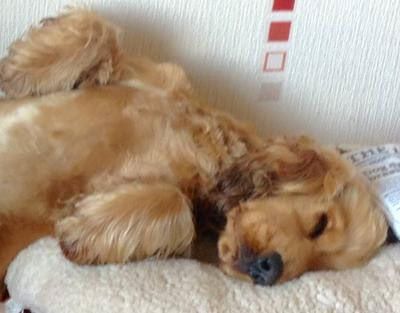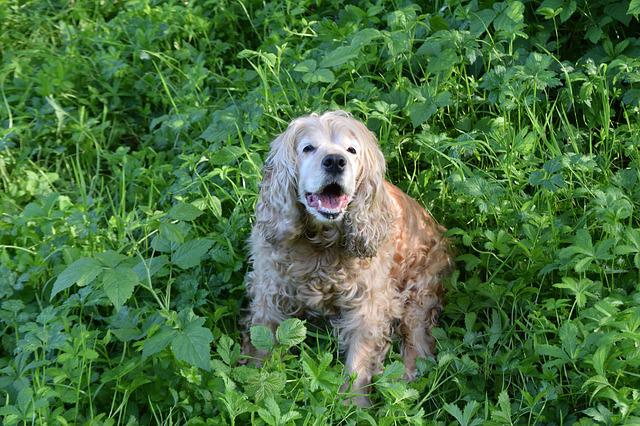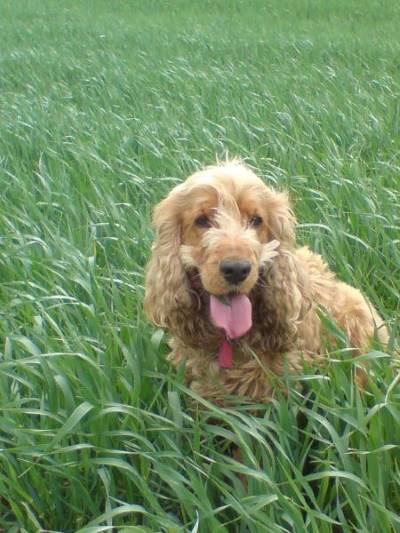- Home
- Puppy training
- How to stop your puppy barking
How To Stop Your Puppy Barking
A young puppy barking can seem cute at first, but if you let it get out of hand, it can soon become a problem for you, your neighbours and visitors to your home.
Learn what causes your puppy to be vocal and discover 5 easy ways to stop your puppy from barking.
So, Why Is My Puppy Barking?
 There's someone at the door Mum!
There's someone at the door Mum!He's Trying To Tell You Something!
Puppies don't speak; they bark.
Puppy barking is completely natural; it's their way of communicating with us.
When your puppy barks, he may be trying to tell you something, for example:
- frightened, bored, or lonely,
- cold or hungry,
- frustrated, anxious or unhappy,
- heard someone at the door,
- seen someone walking around the garden,
- wanting you to play with him,
- wanting your attention for any number of reasons!
So, when your puppy barks, you must try to understand what he's saying to you.
You can do this by observing your puppy; take note of his moods and his behaviour.
Once you understand what's causing it, you can determine how best to stop your puppy barking.
Frustration Can Cause Puppy Barking
Frustration can also cause your puppy to become vocal.
Puppies need a routine, and they need consistency; without them, puppies can become frustrated; and we know frustrated puppies bark!
Inconsistent training and use of command words will only serve to confuse your Cocker puppy, leading to frustration.
Make sure that family members also buy into this consistency, and keep your puppy frustration-free!
Puppy Barking: Remove The Cause
If you understand what's causing your puppy's barking, you can then offer up the correct solution to teach puppy to stop barking.
For example, taking him for a walk or giving him a cuddle won't satisfy his hunger if your puppy's hungry. He will just keep on barking because he wants something to eat.
In this instance, feed your puppy, and he'll most likely stop barking.
In most cases, you can train puppy to stop barking by removing the cause, and it can be done simply and without fuss.
 This duck won't play with me!
This duck won't play with me!Let me give you a couple more examples:
Problem: Your puppy is barking because he's bored.
Solution: Give him a toy to stimulate him, such as a Kong or something similar. Alternatively, hide a few treats around the house and let him sniff them out. You may need to give him a little help to find them at first, but he'll soon get the hang of it!
Problem: The kids are teasing him or getting too excited, and he's feeling a bit overwhelmed. It's making him bark.
Solution: Tell the children to settle down and stop teasing the puppy!
Problem: Your puppy is cold and tired.
Solution: Warm him up! Give him a cuddle or put him in his warm cosy crate with a blanket and let him settle down and sleep.
You can see that simply removing the cause of the problem will stop the puppy from barking.
Decide When Puppy Barking Is Acceptable
There may be times when you feel it's acceptable for your puppy to bark, for example, when there's a prowler in the garden. Consider what you and your family feel is acceptable and what is inappropriate barking.
Take action now and 'teach' your puppy when he can and can't bark.
Left unchecked, puppy barking can soon become a (bad) habit, and habitual barking can be very difficult to break; it will only end in tears.
Yours!
Don't Inadvertently 'Reward' Your Puppy For Barking
Don't fall into the trap of giving in to your puppy's barking all of the time. He may learn that he can easily get what he wants by barking and this will make things much more difficult for you.
The best way to avoid this is to teach your puppy to 'Be Quiet' (see below) and then when he's quiet ask him to give you his paw or to sit down. Then you can 'reward' him with what it was he was asking for in the first place.
This way, your puppy won't associate his barking with his reward.
5 Easy Ways To Stop Your Puppy Barking
There are lots of different methods to stop dogs barking, some rather gruesome, others more acceptable.
1: Teach Him The 'Be Quiet' Command
One of the easiest ways to stop your puppy or dog barking is to teach him the "Be Quiet" command.
This may sound contradictory, but the aim is to train your dog to bark and then teach him to stop barking!
Ideally, this training should be done early while your Cocker is still a puppy.
If you have an older dog that needs training, it's still not too late; however, you and your pooch may just have to put a little more time and effort into the training!
How to Stop Your Puppy Barking
Wait for your dog to bark. If he fails to come up with the goods, I find a knock at the door, or a ringing doorbell will usually do the trick!
- Let your dog bark a couple of times before showing him a tasty treat, one he simply can't resist, and calmly say your command words, like, "Be Quiet" or "Quiet".
- Choose a command that fits well with your family, and make sure you all stick to the same one.
- When your dog catches sight of or smells the treat, it should focus his attention and encourage him to stop barking. If he manages to stay quiet for 5 seconds, reward him with the treat and tell him he's a "Good Quiet Boy".
- Don't reward him if he starts barking before the 5 seconds are up.
- Try the exercise again in a couple of minutes, but this time reward him for remaining quiet for 10 seconds, gradually working up to 15 seconds. (Wherever possible, don't set your dog up to fail!).
 Zzzzzzzz
ZzzzzzzzPractice the above exercise 5 times each session, and train twice daily for 3 days.
This exercise aims to help your dog associate his reward with your command to "Be Quiet" and his subsequent silence. He'll soon learn that barking has no mileage and is more beneficial if he responds to your "Be Quiet" command.
Don't shout and don't get excited or show frustration if things aren't going well.
Be patient, train hard, stay calm and in control, and it won't be long before your Cocker Spaniel has learned to bark and be quiet on command.
When your dog responds well to this command, slowly withdraw the food treats (you don't want an overweight puppy!) and heap on the praise, strokes, and cuddles.
If your puppy is easily excited and prone to barking, then encouraging excitement will only worsen any barking problem.
Understand what excites him, a particular game, for example, and avoid it for now. You can always re-introduce the game later when he's older and less excitable.
Stop Puppy Barking: Tips
- Don't ever let your Cocker Spaniel get away with excessive barking. If you do, you'll be undoing any previous training and will have to work extra hard to get your dog back on track.
Don't forget to give your puppy lots of basic obedience training regularly to help him grow into a well-mannered adult dog!
- Act quickly and be consistent; don't allow any gratuitous barking.
- Practice regularly to ensure the training sticks!
- Always stay calm; don't shout at your dog to be quiet.
- Remember to praise him when he's quiet to encourage his good behaviour.
- Tired dogs rarely bark, so don't forget to keep your dog regularly exercised and mentally stimulated.
Follow these rules and exercises, and it won't be long before you can stop your dog's barking with one simple command!
2: Do You Have A Barking Puppy When The Doorbell Rings?
If your puppy barking problem is caused mainly by a ringing doorbell, this one will work for you!
Have someone stand at the front door and ask them to ring the doorbell 5 times at about 30-second intervals.
Go sit with your puppy, have some treats at the ready, and wait for your cue.
As soon as the doorbell rings, enthusiastically offer the small treat to your puppy. If your puppy is anything like mine (greedy!), he'll take it, and won't bark because it's impossible to eat and bark simultaneously!
 Mum, come and look!
Mum, come and look!When your puppy stops barking, praise him, wait for a couple of seconds and give him another treat.
When the doorbell rings again, offer him another treat and repeat the praise.
If you practice this regularly, it won't be long before your puppy becomes de-sensitized to the sound of the doorbell. He'll begin to look at you in anticipation of a treat or verbal praise.
I don't have a problem with Max barking when the doorbell rings, but I expect him to stop when he's asked to. I tell him he's a good boy (for alerting me to 'danger' or someone at the door), and then we go and answer it.
It can be embarrassing and uncomfortable for you and your visitors if Fido barks at them each time they pay a visit. If you'd like to learn how to stop your dog barking when visitors arrive, or you'd like to learn more about acclimatizing your puppy to the doorbell, follow this link!
3: Stop Your Puppy Barking Using A 'Muzzle Clamp'
There are many dangers in the wild, and before dogs became domesticated, their mother needed to keep her puppies quiet in times of danger. She would do this by gently but firmly holding her puppy's muzzle in her mouth whilst giving off a low, throaty growl.
This wouldn't hurt her pup but would stop him from barking and keep him quiet until the threat of danger had passed.
You can mimic this behaviour by holding your puppy's collar with one hand (this will keep his head from moving) and clamping your other hand gently around his muzzle. Take care not to block his little nose; you want him to be able to breathe correctly.
He may struggle a little at first, so being extremely gentle with him is essential.
At the same time, in a firm, calm tone, ask your puppy to 'be quiet'.
When he stops barking, reward him.
If you practice this regularly and you're consistent every time he barks, it won't be too long before you can drop the muzzle clamping because your puppy will respond to your 'be quiet' command alone.
The above may be used on an older dog too, but only if you're confident he won't try to bite you for clamping his muzzle closed!
Otherwise, for an adult dog, you might like to try one or more of the methods listed in this article on how to stop your dog from barking.
4: Stop Your Puppy Barking Using A Water Spray
A spray bottle is a cheap and effective way to stop your puppy barking.
An ordinary handheld water spray from any garden centre will do, just fill it up with water and wait for your puppy to bark.
The squirt of water will 'shock' your puppy into being quiet, and the unpleasant taste will help him to associate it with his barking and act as a deterrent.
Helpful Tip: You can also add a little lemon, lime juice, or vinegar, which will make it taste bitter and unpleasant.
As soon as he barks, give him a quick squirt and tell him to be quiet. Don't spray into his eyes; just aim for his mouth. That should do the trick.
When he stops barking, wait a few seconds before rewarding him so that he learns he's being rewarded for being silent, not barking.
5: Stop Your Puppy Barking Using A Correction Collar
A barking correction collar may help to stop your puppy from barking.
It's a device that fits onto your pet's collar (sometimes it comes with a collar already attached) and is triggered by the dog barking.
It's meant to 'shock' your puppy into being quiet.
There are several different kinds available; for example, those spray a squirt of citronella, sound an audible beep, or worse - give a small electrical shock! (However, I definitely don't recommend the latter, and especially not for a young puppy).
One of the problems with these collars is that they can be triggered by another dog's barking, which isn't really fair is it?
Puppy Barking: Summary
It's not always easy to stop a puppy from barking, especially if it's allowed to develop into a habit. Nip it in the bud. As soon as your puppy begins to bark, acknowledge it, deal with it and then move on.
By the way, puppies that get lots of play and exercise tend not to bark much because they're relaxed and contented...and usually whacked from all that work!
As with all puppy training, consistency is vital.
Don't let your puppy get away with barking to get your attention or get something he wants, like his favourite toy. (Although you can give him his toy, don't let him have it until after he's stopped barking. Don't let him think he was rewarded with his toy for barking).
Always tell him to stop, wait a few seconds, and then reward him with praise or a treat.
Some dogs are crafty and may learn that if they bark and stop and wait a while, they'll get a treat! It might be a good idea to vary the rewards: praise, toys, or a bit of rough and rumble.
Photo Credits for How To Stop Your Puppy Barking:
1. Image by Giada from Pixabay
2. Willeecole at https://www.dreamstime.com/stock-photo-hunting-dog-image18339120#-
3. Alan from Leuchers - kind visitor submitted photo
4. Image by vik-tor from Pixabay



